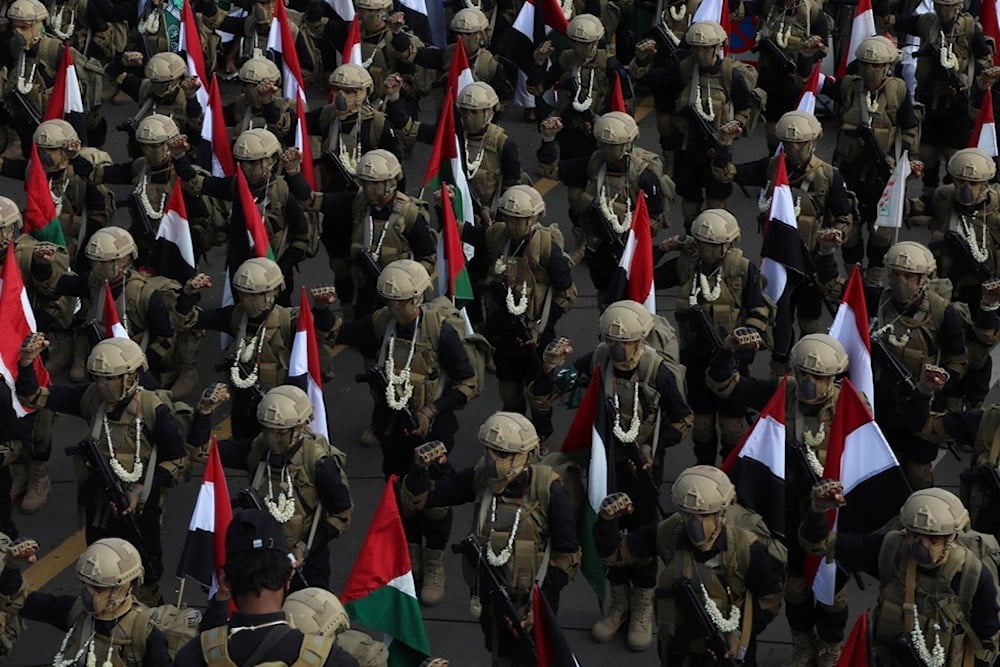Yemen to turn challenges into opportunities, Sayyed al-Houthi says
Sayyed Abdul Malik al-Houthi warned that US and Israeli actions aim to halt Yemen’s support for Palestine, highlighting the gains made during the September 21 revolution.
-

Ansar Allah fighters take part in a weekly anti-Israeli rally in Sanaa, Yemen, Friday, August 29, 2025 (AP)
The leader of Yemen’s Ansar Allah movement, Sayyed Abdul Malik al-Houthi, said Sunday that US and Israeli efforts targeting Yemen are aimed at halting its support for the Palestinian people, stressing that such attempts “have failed to achieve their objectives.”
In a speech marking the anniversary of the September 21 Revolution, Sayyed al-Houthi stated that “the United States and the Israeli occupation realised that attacking the Yemeni people and trying to subjugate them again will be very costly.” He added that “the arms of Zionism are still continuing” their aggression against Yemen, even though “the Israeli occupation knows that the Yemeni people will not remain silent and will have a role at the level of the ummah.”
He said the challenges facing Yemen “help its people turn them into opportunities, build a strong and cohesive structure, and transform Yemen into a militarily strong country with a resistant economy, local production, and strong agriculture.” Sayyed al-Houthi reaffirmed the steadfastness of the Yemeni people in “supporting occupied Palestine and confronting Israeli schemes.”
'Insistence on violating the ummah'
“The US-Israeli position after the Qatar summit is an insistence on violating the ummah,” he warned, adding that “the Israeli occupation constitutes a grave danger to the ummah and is moving under a broad heading to reshape the Middle East.”
Addressing Syria, Sayyed al-Houthi cautioned that “what is being said now about work to achieve a security agreement (with Israel) will never protect Syria.”
US wants aggression to continue
Turning to developments in Gaza, he said: “The United States seeks to continue the aggression and to use the veto to obstruct any efforts to stop the aggression.” He also dismissed recent recognitions of a Palestinian state by some European countries as “a formal step, merely a media position that will not have an actual effect in preventing the Israeli enemy from continuing its crimes.”
“The Arabs have not yet reached even the simplest actual stance, which is boycotting and halting cooperation with the enemy on the military level,” Sayyed al-Houthi said, noting that “some Gulf regimes and Arab countries are cooperating with it in intelligence.”
On the anniversary of the 2014 uprising, Sayyed al-Houthi described the September 21 Revolution as “an authentic revolution of the Yemeni people, launched from a purely Yemeni popular will, with no external role.” He said its greatest achievement was “liberation from foreign guardianship,” emphasising that “before this achievement, Yemen was under the domination of its enemies, led by the Americans.”
He recalled that “meetings of the US ambassador and the interventions of the American embassy were public and clear in all fields,” saying the situation before the revolution “was catastrophic and extremely dangerous, and American tutelage was driving the country toward total collapse.”
International pressure and accusations of war crimes
Israeli Prime Minister Benjamin Netanyahu faces mounting international isolation. While he continues to enjoy support from the Trump administration, other global actors, including European allies, have condemned the "Israeli" campaign and warned of war crimes.
The International Criminal Court has accused Netanyahu of using starvation as a weapon and presiding over what some legal experts describe as acts of genocide, allegations the "Israeli" government firmly denies.
Internally, critics argue that Netanyahu is prolonging the war to maintain power and placate far-right elements within his coalition. The conflict, they say, has delayed any public reckoning for the intelligence failures that preceded the Palestinian-led October 7 operation.
About 20 captives are believed to still be alive in Gaza, along with the remains of up to 28 others.

 4 Min Read
4 Min Read








